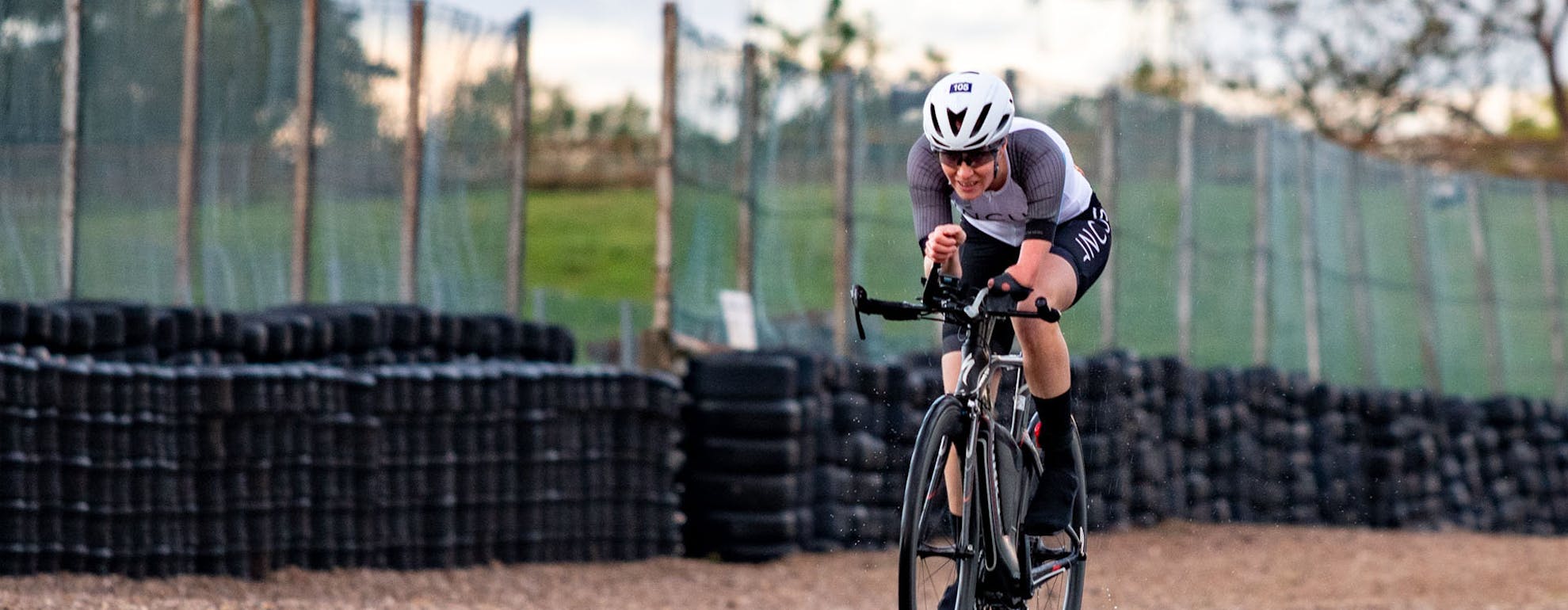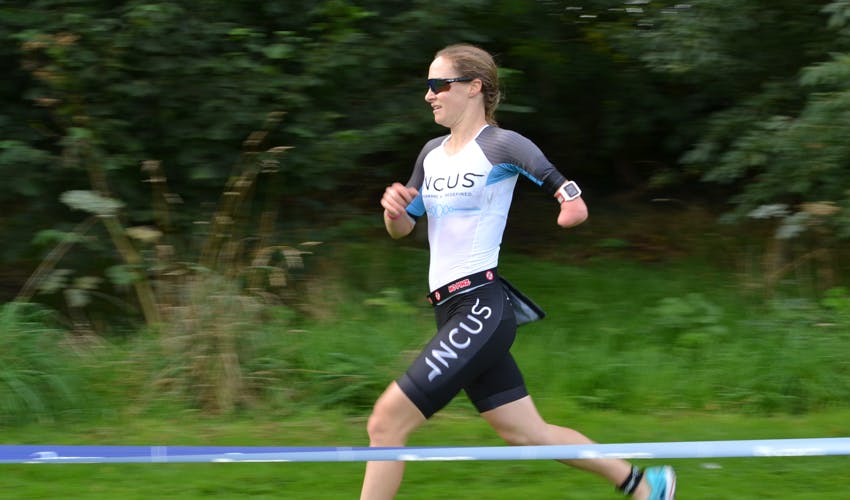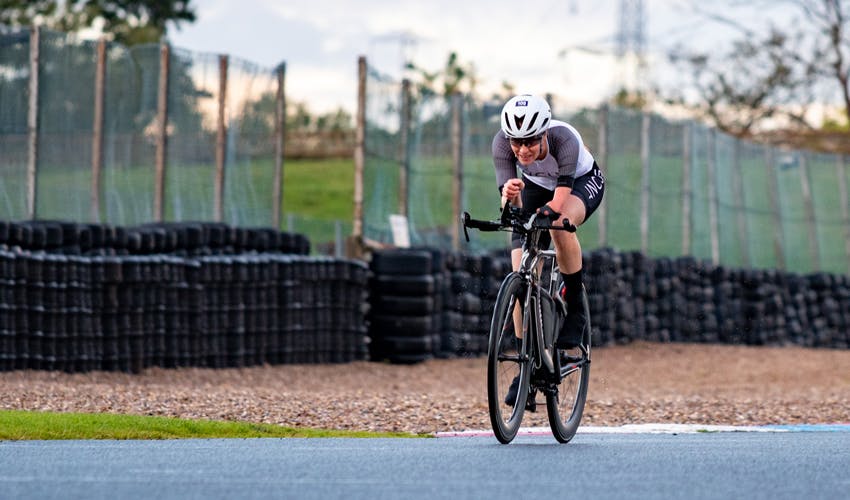
Q&A with GB Paralympian Claire Cashmore MBE
We are extremely delighted to welcome Paralympics GB Paralympian Claire Cashmore MBE as the latest addition to our SportsShoes.com team.
Claire has enjoyed an incredibly long and successful career, first as a gold medal-winning Paralympic swimmer and now as a triathlete, becoming ITU World Champion in 2019.
In Part 1 of an interview, we caught up with our new SportsShoes athlete to discuss her incredible journey so far and to find out what she has planned for the future.
ㅤ
Hi Claire – Welcome to the team! You’ve enjoyed an incredibly successful international career across a multitude of sporting disciplines. Let’s start at the beginning. What were your first experiences as a young athlete and have you always had an interest in swimming and other endurance sports?
Thank you very much, it’s great to be a part of the team. Growing up I was really scared of the water, but as it’s an essential life skill my parents strongly encouraged me to become as comfortable as possible with the water. I soon realised the freedom that the water gave me and I just wanted to spend all day in the pool splashing around and pretending I was a mermaid. It wasn’t until I moved back to the UK (from Dubai) at the age of 12 that I started to take swimming more seriously. At that time there wasn’t much information about disability sport, so I joined an able-bodied club (Wyre forest) in the West Midlands and competed at able-bodied competitions. It was by chance that I was introduced to disability competitions by a lady called Margaret Holmes, whose son was a Paralympic champion. Thankfully nowadays there are more opportunities and signposting for disability sport than when I was growing up.
ㅤ
How long have you been competing?
I have been competing on the world stage since I was 16, so, in total it’s been almost 17 years, which makes me feel very old. I still love what I do and I still have that hunger to achieve, which is incredibly important in the world of sport. I believe when you fall out of love with sport (for a prolonged period) then it’s probably a sign that you are ready to retire.
ㅤ
Your first Paralympic Games was Athens in 2004, where you won two bronze medals for the 100m backstroke (S9) and the 200m individual medley (SM9). Can you describe what this experience was like? especially at such a young age.
I was a very excitable teenager, walking around the Paralympics with wide eyes and an open mouth, ready to take on any challenge. I sometimes think life would be much easier if we still maintained that carefree, no pressure attitude throughout our career haha. Athens was an incredible experience but more importantly than the medals it was a real turning point for me in my life, because it was the point where I finally became comfortable within my own skin. Prior to the Paralympics I was incredibly self-conscious and used to hide my arm underneath my sleeve, competing at the Games and seeing so many people with different disabilities who didn’t really give a monkey’s about what people thought of them made me reassess and realise that life is too short to care about what other people think. It was amazing to finally feel comfortable within my own skin.
ㅤ
Since Athens, you’ve competed at every other Paralympics in Beijing 2008, London 2012 and Rio in 2016. Which of these was your favourite experience and why?
Every Paralympic Games is incredibly special for different reasons, but my favourite has to be London. Just thinking about the crowd and the atmosphere still gives me goosebumps, to describe it is beyond words. I remember regularly pinching myself to check it wasn’t a dream. I was very lucky to be able to experience a home Paralympic Games within my sporting career.
London was also a huge turning point for the Paralympic movement and it really put the Paralympics on a pedestal. I feel really proud to have played a very small part in that legacy.
ㅤ

ㅤ
I know that you have a very structured and intense training schedule, can you give us an example of a typical day in the life of an elite athlete?
The thing I love about triathlon is that it is incredibly varied and therefore every day of the week is different, an example of a typical Monday for me is:
Wake up at 8.20 (little lie in)
Breakfast
Brick in the morning (bike-run)
Early Lunch
Aerobic endurance swim (90 mins)
Snack
Run Drills (45 mins)
Snack
Dinner
Chill and bed
ㅤ
Tell us more about you. How do you balance and manage your training alongside life and work?
I am very lucky to be a full-time athlete, which means I can put all my energy into making sure that I eat, train and sleep well. Being a full-time athlete can be very intense, hence maintaining a healthy balance is crucial to ensure that it’s not all-consuming. Throughout my career I have learnt that, for me to be happy and successful, it's important that I allow time to see friends and family and switch off from the bubble of sport. Obviously, this massively varies depending on the time in the season. This has probably been the hardest thing for me over the last year, as I have not been able to have an outlet away from sport.
When time and training permits (dependent on time in the season) I go into schools as an athlete mentor, and give motivational talks within the corporate world, which I really enjoy. I think it’s important to do things outside of sport that develop me as a person and help develop skills for life after sport.
ㅤ
What are your interests when you’re not training or competing?
I am a huge foodie so myself and my boyfriend love going out and trying new restaurants. I also love to travel the world and immerse myself in different cultures.
ㅤ
The Paralympics in Tokyo were postponed last year for obvious reasons. How did you deal with the disappointment of this news?
It’s been a mixed rollercoaster of emotions. It can be hard in times of uncertainty to keep pushing forward when you don’t have a goal to work towards. However I decided to flip this on it’s a head and see it as a positive, it’s been really great to have an extra year to work on areas I previously didn’t think I would have time to work on. Time in sport is so valuable and therefore I really want to use the extra time wisely to be even better prepared for Tokyo 2021.
ㅤ
How have you coped during the periods of national lockdown? Have you had to change your focus and training and has it been a real challenge?
Throughout this lockdown we have been extremely lucky to access all facilities under elite athlete exemption. The biggest change has been doing all my training (other than swimming) on my own. I am quite a sociable person so I have found this pretty tough, but I think it’s also been a really good learning curve for me. The first lockdown was very different as we had no access to any facilities and therefore creativity and thinking outside the box was needed for the swim and gym. We even bought a paddling pool and a bungee cord to try and mimic the feeling of swimming through water. I can conclude that 13-degree water was definitely not fun. Check out my Instagram if you want a giggle.
ㅤ

ㅤ
After the Paralympics in Rio, you switched your focus from swimming to triathlon. What made you change disciplines? Were you just looking for a fresh challenge?
To be honest, it was a combination of things. After Rio, I was dropped from the swimming squad so I needed to decide what was next. I took a few months out to decide what I really wanted to do moving forward - did I want to carry on as a swimmer and support myself? Try triathlon? Or go into the real world and get a real job? I had always wanted to give triathlon a go and to step outside my comfort zone by tackling a new challenge, so I decided I would love to see how far I could get in triathlon.
ㅤ
It was clearly a decision worth making, as you were crowned the ITU World Champion in 2019 - congratulations! Obviously, this was the result of all your intense commitment and dedication, but just how hard is it to train for three disciplines as opposed to just one?
Getting the balance can be tough but the variety is what I love the most. I was used to doing 9x2 hour swim sessions and 3-5 land sessions a week as a swimmer, so it was great to be able to mix things up.
The hardest thing for me was getting my floppy ankles and joints used to the impact of running. My body didn’t particularly like being out of the water haha. My first race was a huge shock to the system, I was used to racing for 80 seconds rather than an hour, I quite quickly learnt to control my excitement and not sprint off like a headless chicken.
Another area I found challenging in my transition was the increased admin and faff for triathlon, including the huge amount of technology, maintenance of bikes and making sure you have the best equipment for three disciplines, whereas swimming is very simple - it’s just you, a swimming costume and a stopwatch.
ㅤ
Did you imagine that you would be so successful after only making the switch in 2016? Do you have any advice for other athletes who might be faced with a similar decision?
I am not sure I really knew fully what I was getting myself in for. I definitely put a lot of pressure on myself to transition quickly, but the first few years were definitely a rollercoaster and a huge learning curve. The best bit of advice I would give is don’t be scared to step outside your comfort zone and do something that scares you. The reward makes it worth it.
ㅤ
You can follow Claire and all of her running adventures here.
ㅤ
Are you feeling inspired? Then join our SportsShoes Strava Run Club and become part of our inclusive community.
And for more inspirational tips to become stronger, better and happier, then check out our Motivation category. Because it’s no fun standing still.
Welcome
Welcome to the SportsShoes Motivation Hub! From real-life stories, tips and inspiration, here you'll find everything you need to motivate you to keep pushing your limits and break PBs.
Read More
Share this
Featured Articles
View All